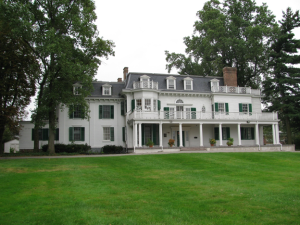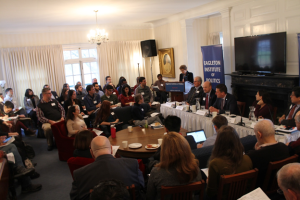by Helena Mello On November 30, the Eagleton Institute of Politics, along with iJOBS, hosted the Eagleton Science and Politics Workshop: Scientists in Politics. As introduced by Eagleton’s Director Ruth B. Mandel, PhD, this workshop is part of a series of events that aim to (1) encourage political engagement in the scientific community, and (2) explore how science, technology, and politics intersect. I had the opportunity to attend the workshop and will share some highlights of it with you.  Wood Lawn Mansion, the historic home of the Eagleton Institute of Politics. Panelists: Christopher Molloy, PhD. Dr. Molloy is the Interim Chancellor of Rutgers University New Brunswick. Andrew Zwicker, PhD. Dr. Zwicker is the Assemblyman for NJ 16th Legislative District, Head of Science Education Committee and head of Communications and Public Outreach at the Plasma Physics Laboratory at Princeton University. Caroline Weinberg, MD, MPH. Dr. Weinberg is Founder and Executive Director of the March for Science, Health Educator and Researcher. Samuel Wang, PhD. Dr. Wang is a Professor of Molecular Biology at Princeton Neuroscience Institute. Dr. Wang is also affiliated with the Program in Law and Public Affairs and the Center for Information Technology Policy at Princeton University. Eagleton’s Associate Director John Weingart opened the plenary session asking the panelists to describe their science path and political path. Mr. Weingart raised an interesting question: have those paths always been intertwined? The discussion that followed showed that scientists usually come in contact with politics when there is an absolute need for that, not due to the understanding that politics permeates all aspects of our society. Except for budgeting allocation, scientists do not generally seem to think that it is worthy of getting involved with politics. However, the panelists highlighted that politics is a crucial player in all facets of our lives – and so is science! Dr. Weinberg mentioned the anti-vax movement, adding that it has been around for quite some time. Only recently did we start to worry about the consequences of this movement, such as decreasing immunization rates even after the retraction of the study linking autism and vaccination. Had we been more involved in conveying our science to the general public, perhaps there would be less people questioning the science behind vaccination. While discussing the importance of communicating our science, one of the panelists brought up a topic that iJOBS too, deeply cares about: communication. In fact, scientists are long overdue when it comes to communicating their science. It is definitely not easy to convey a scientific concept to a lay audience. However, how are scientists going to demand the public opinion to stand up for science if the public does not understand science itself? One member of the audience then asked: “how can I effectively connect with the general public when communicating science?” Dr. Molloy emphasized that, “you should listen to the person you are communicating with”. It is also important to know your audience: what is their education level? What are their interests? Dr. Wang added that with this information in mind you can then talk about what people care about. Dr. Weinberg emphasized that we should focus on the importance of science rather than getting “hung up on the data” when connecting with the public. On those lines, Dr. Zwicker brought up that “science is a piece of policy”, but not the sole player on it. For me and other scientists that are invested in bridging the gap between the lab and the society, these arguments resonate well and call upon us to act. We need to actively listen to our communities’ priorities and interests. In summary, communication means exchange of opinions, ideas, and experiences. There is no reason to talk if there isn’t someone willing to listen. Rather, it is important to understand what they care about and focus our communication through those channels. The plenary session was followed by a Political Engagement Exercise in which we worked to “identify three concrete steps as a path to political engagement”. My exercise group was moderated by Dr. Ashley Koning, Director of Eagleton Center for Public Interest Polling. After defining two policy issues that we were individually most passionate about, Dr. Koning guided us in identifying the steps to effectively engage with those issues. Me and other colleagues share the two issues I wrote down: open access journals and fair access to healthcare. We discussed the SMART approach to setting goals, which enabled us to set effective goals as scientists towards politics. I decided that my next step would be to identify three open access journals in my field and read their latest publications weekly. During the exercise, we had the opportunity to connect with each other and learn about the topics our colleagues find most pressing. Even though we were from diverse backgrounds, it was easy to realize that we share a fundamental common goal: increasing appreciation for and trust in science and making policies based on strong science rather than mere belief.
Wood Lawn Mansion, the historic home of the Eagleton Institute of Politics. Panelists: Christopher Molloy, PhD. Dr. Molloy is the Interim Chancellor of Rutgers University New Brunswick. Andrew Zwicker, PhD. Dr. Zwicker is the Assemblyman for NJ 16th Legislative District, Head of Science Education Committee and head of Communications and Public Outreach at the Plasma Physics Laboratory at Princeton University. Caroline Weinberg, MD, MPH. Dr. Weinberg is Founder and Executive Director of the March for Science, Health Educator and Researcher. Samuel Wang, PhD. Dr. Wang is a Professor of Molecular Biology at Princeton Neuroscience Institute. Dr. Wang is also affiliated with the Program in Law and Public Affairs and the Center for Information Technology Policy at Princeton University. Eagleton’s Associate Director John Weingart opened the plenary session asking the panelists to describe their science path and political path. Mr. Weingart raised an interesting question: have those paths always been intertwined? The discussion that followed showed that scientists usually come in contact with politics when there is an absolute need for that, not due to the understanding that politics permeates all aspects of our society. Except for budgeting allocation, scientists do not generally seem to think that it is worthy of getting involved with politics. However, the panelists highlighted that politics is a crucial player in all facets of our lives – and so is science! Dr. Weinberg mentioned the anti-vax movement, adding that it has been around for quite some time. Only recently did we start to worry about the consequences of this movement, such as decreasing immunization rates even after the retraction of the study linking autism and vaccination. Had we been more involved in conveying our science to the general public, perhaps there would be less people questioning the science behind vaccination. While discussing the importance of communicating our science, one of the panelists brought up a topic that iJOBS too, deeply cares about: communication. In fact, scientists are long overdue when it comes to communicating their science. It is definitely not easy to convey a scientific concept to a lay audience. However, how are scientists going to demand the public opinion to stand up for science if the public does not understand science itself? One member of the audience then asked: “how can I effectively connect with the general public when communicating science?” Dr. Molloy emphasized that, “you should listen to the person you are communicating with”. It is also important to know your audience: what is their education level? What are their interests? Dr. Wang added that with this information in mind you can then talk about what people care about. Dr. Weinberg emphasized that we should focus on the importance of science rather than getting “hung up on the data” when connecting with the public. On those lines, Dr. Zwicker brought up that “science is a piece of policy”, but not the sole player on it. For me and other scientists that are invested in bridging the gap between the lab and the society, these arguments resonate well and call upon us to act. We need to actively listen to our communities’ priorities and interests. In summary, communication means exchange of opinions, ideas, and experiences. There is no reason to talk if there isn’t someone willing to listen. Rather, it is important to understand what they care about and focus our communication through those channels. The plenary session was followed by a Political Engagement Exercise in which we worked to “identify three concrete steps as a path to political engagement”. My exercise group was moderated by Dr. Ashley Koning, Director of Eagleton Center for Public Interest Polling. After defining two policy issues that we were individually most passionate about, Dr. Koning guided us in identifying the steps to effectively engage with those issues. Me and other colleagues share the two issues I wrote down: open access journals and fair access to healthcare. We discussed the SMART approach to setting goals, which enabled us to set effective goals as scientists towards politics. I decided that my next step would be to identify three open access journals in my field and read their latest publications weekly. During the exercise, we had the opportunity to connect with each other and learn about the topics our colleagues find most pressing. Even though we were from diverse backgrounds, it was easy to realize that we share a fundamental common goal: increasing appreciation for and trust in science and making policies based on strong science rather than mere belief.  Institute director Ruth B. Mandel announced the Eagleton Science and Politics Fellowship during a gathering of Scientists in Politics, featuring Rutgers University-New Brunswick Chancellor Christopher Molloy, physicist and New Jersey Assemblyman Andrew Zwicker, March for Science co-founder and national co-chair Dr. Caroline Weinberg, and Princeton University Professor Sam Wang. Before you leave, I would like to share with our iJOBS blog readers the newly launched Eagleton Science and Politics Fellowship. This fellowship offers PhD-level scientists and engineers the opportunity to apply their scientific training and expertise to the development and implementation of relevant state policy in New Jersey. If you are graduating soon or are a postdoc and have ever envisioned yourself applying your science background to make a great impact in the population, I urge you to not miss this opportunity! Applications are accepted through January 13, 2019 and more information can be found here. Edits and contributions to this post were made by Paulina Krzyszczyk and Vinam Puri.
Institute director Ruth B. Mandel announced the Eagleton Science and Politics Fellowship during a gathering of Scientists in Politics, featuring Rutgers University-New Brunswick Chancellor Christopher Molloy, physicist and New Jersey Assemblyman Andrew Zwicker, March for Science co-founder and national co-chair Dr. Caroline Weinberg, and Princeton University Professor Sam Wang. Before you leave, I would like to share with our iJOBS blog readers the newly launched Eagleton Science and Politics Fellowship. This fellowship offers PhD-level scientists and engineers the opportunity to apply their scientific training and expertise to the development and implementation of relevant state policy in New Jersey. If you are graduating soon or are a postdoc and have ever envisioned yourself applying your science background to make a great impact in the population, I urge you to not miss this opportunity! Applications are accepted through January 13, 2019 and more information can be found here. Edits and contributions to this post were made by Paulina Krzyszczyk and Vinam Puri.
iJOBS Blog